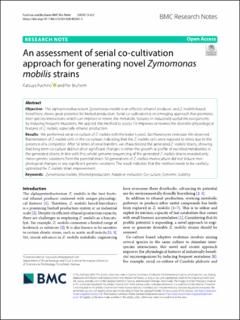An assessment of serial co-cultivation approach for generating novel Zymomonas mobilis strains
Peer reviewed, Journal article
Published version

Åpne
Permanent lenke
https://hdl.handle.net/11250/2687820Utgivelsesdato
2020Metadata
Vis full innførselSamlinger
Sammendrag
Objective
The alphaproteobacterium Zymomonas mobilis is an efficient ethanol producer, and Z. mobilis-based biorefinery shows great potential for biofuel production. Serial co-cultivation is an emerging approach that promotes inter-species interactions which can improve or rewire the metabolic features in industrially useful microorganisms by inducing frequent mutations. We applied this method to assess if it improves or rewires the desirable physiological features of Z. mobilis, especially ethanol production.
Results
We performed serial co-culture of Z. mobilis with the baker’s yeast, Saccharomyces cerevisiae. We observed filamentation of Z. mobilis cells in the co-culture, indicating that the Z. mobilis cells were exposed to stress due to the presence of a competitor. After 50 times of serial transfers, we characterized the generated Z. mobilis strains, showing that long term co-culture did not drive significant changes in either the growth or profile of excreted metabolites in the generated strains. In line with this, whole genome sequencing of the generated Z. mobilis strains revealed only minor genetic variations from the parental strain. 50 generations of Z. mobilis monoculture did not induce morphological changes or any significant genetic variations. The result indicates that the method needs to be carefully optimized for Z. mobilis strain improvement.
